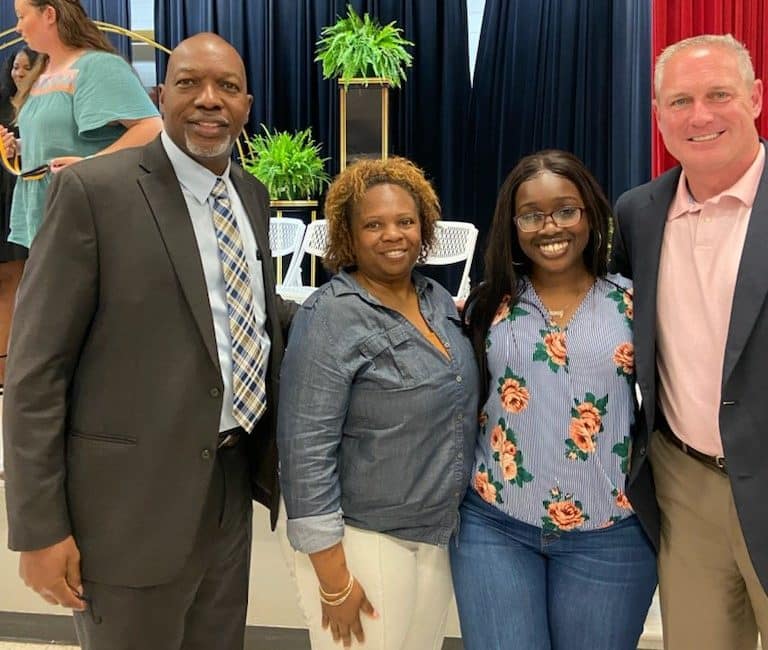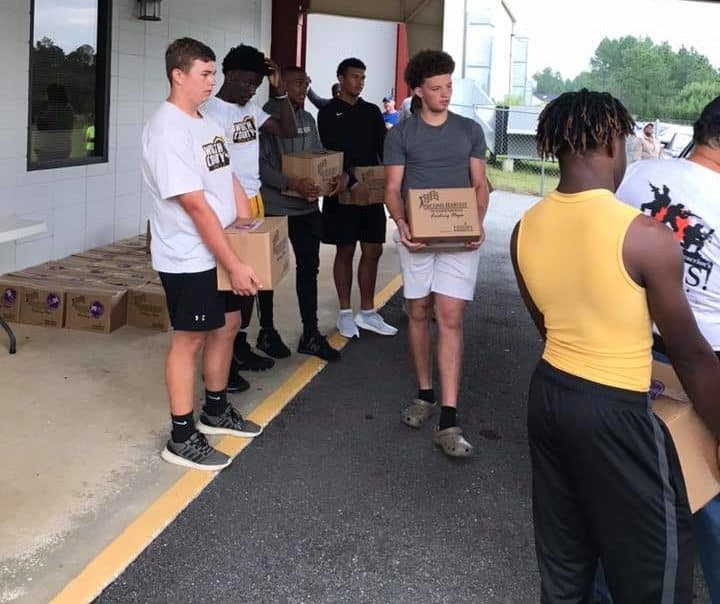Georgia Family Connection Cohort Working to Increase Student Retention
Print This Post
Jenkins County is one of the 10 counties in the cohort.
By Diana St. Lifer
Georgia’s on-time high school graduation rate has steadily increased since 2011, with a decade high of 83.8% in 2020. And the rate of teens who are high school dropouts decreased to 4.6% from 2015 to 2019—the lowest it’s been since 2006. But there are counties throughout Georgia where those numbers are trending in the opposite direction.
The challenge of keeping students in school and on track to graduate was exacerbated by COVID-19. Schools closed, forcing students into a virtual learning environment that teachers, parents, and students did not embrace. When schools reopened, districts faced the arduous task of re-engaging students back inside the classroom.
“There were far too many students who were simply missing,” said Georgia Family Connection Partnership (GaFCP) Partner Initiatives Director Akia Lewis. “They never logged on to virtual learning, and school and community partners still don’t know where they are. There are others who took on more responsibilities in the household, from assisting with younger children to working more hours to contribute financially, who have not transitioned back to school as full-time students.”
To help schools and community partners get students back on track toward graduating, the Community Partnership for Supporting Youth Cohort formed in 2021 with 10 counties: Ben Hill, Crawford, DeKalb, Hall, Jenkins, Macon, Mitchell, Treutlen, Quitman, and Worth.
“The community approach is essential to high school completion and youth development because schools sit inside communities. They don’t exist alone and can’t provide all the services students need to thrive,” said Stephanie Flowers, GaFCP Community Partnership for Supporting Youth specialist. “The community can provide additional services and supports students need, not only to complete high school, but also to improve education outcomes and development for students pre-K through 12th grade and beyond.”

Quintesia Payne (second from right) was the Treutlen County 2021-22 school year scholarship recipient.
Implementing best practices for youth development and carving out alternative pathways to high school completion is how the cohort aims to sustain—and eventually accelerate—high school graduation rates across the state. The cohort is partnering with:
- Technical College System of Georgia;
- Regional Education Service Agencies;
- Georgia Department of Education;
- Georgia Office of School Achievement; and
- Communities in Schools of Georgia (CISGA), a leader in high school dropout prevention.
CISGA serves more than 240 schools across Georgia by connecting students to supports in the classroom and beyond. Several of the counties in the cohort have already been working closely with CISGA with the aim to boost collaboration on the statewide level, strengthening efforts to increase on-time graduation and post-school success.
The National Dropout Prevention Center, for example, provides to communities 15 effective evidence-based strategies to help increase high school completion rates. They’re grouped into four categories: foundational (school-community perspective), early interventions, basic core strategies, and managing and improving instruction.
“This approach allows Collaborative partners and other community members that may not be connected to a school to offer support and resources that will remove barriers preventing students from graduating high school and moving into the workforce or on to post-secondary education,” said Flowers. “Every community member is accountable for the quality of education. When all groups in a community provide collective support to the school, a strong infrastructure sustains a caring supportive environment where youth can thrive and achieve.”
The Community Partnership for Supporting Youth Cohort, according to Flowers, can achieve these goals by including more local partners that provide services and share knowledge on how to support strategies to improve education outcomes, all while supporting the work of the Collaborative.

Worth County High School football players served the community.
Bringing people back to the table to collaborate is crucial. “We saw partners hunker down during the height of the pandemic to focus on getting communities through an ever-changing emergency situation,” said Lewis. “A consequence of this has been that some partners have reverted to working in isolation. This cohort is focused on building a whole community approach to supporting high school completion and youth development, which requires authentic partner engagement.”
Flowers pointed out that partners are willing to actively support Collaboratives that help them understand the impact their community has on improving high school completion rates and youth development—and help them see how their support seamlessly fits into strategies that improve outcomes for all students.
Ben Hill County Family Connection partners with Communities in Schools to offer Raising Highly Capable Kids, a 13-week, evidence-based program that supports parents and caregivers of children ages 3 through 14 to increase school success. The Collaborative also will offer Bridges Out of Poverty training to partner organizations, including Communities in Schools.
“The community aspect is the goal of this work,” Lewis said. “Educating our kids requires a comprehensive system that includes community partners to support youth development and high school graduation completion, particularly for those students who are at risk of dropping out.”
Quitman County’s graduation rate decline can be attributed to enrollment. “We struggle with the numbers due to students coming and going within the district,” said Sara Lee Crumbs, Quitman County Family Connection coordinator. “Our most valuable resource is our people. We’re engaging parents on several issues that they’ve brought to our Collaborative, and we have strong partnerships with local officials who have offered support in the way of meeting space, advertising, and other in-kind methods.”
The Collaborative is implementing several strategies that target the whole family and is increasing activities and events that will bolster parent engagement to support its goal of increasing on-time high school completion from 73% in 2020 to 95% in 2024.
“We’ve held our first sessions of the Parent Café, where parents offered suggestions on topics they believe will improve student and parent engagement,” said Crumbs. “We also began the Parent Sessions with guest presenters providing resources and information to parents and caregivers regarding the everyday struggles of raising a child—and challenging parents to re-think their beliefs and behaviors in areas of discipline and interacting with their child in several scenarios.”
Crumbs said discussions are taking place with local leaders and community volunteers on several projects including an entrepreneurial program for students that will highlight the basics in creating and sustaining a business. Field trips, guest speakers, and hands-on activities also will be an integral part of the curriculum as students learn soft skills and how to create and present business plans.
“All the Collaboratives in the cohort want to improve high school graduation rate, but we need to ask what that means in each county—and take stock of the resources and supports already in place for that to happen,” said Flowers. “One county may need help getting its workplan completed, while another may need help identifying partners and understanding how to share roles within the Collaborative. I’m here to provide that support.”
Contact:
Krystin Dean
GaFCP Communications Specialist
706-897-4711
krystin@gafcp.org
Follow us on Twitter: @gafcpnews
Connect with us on Facebook.
